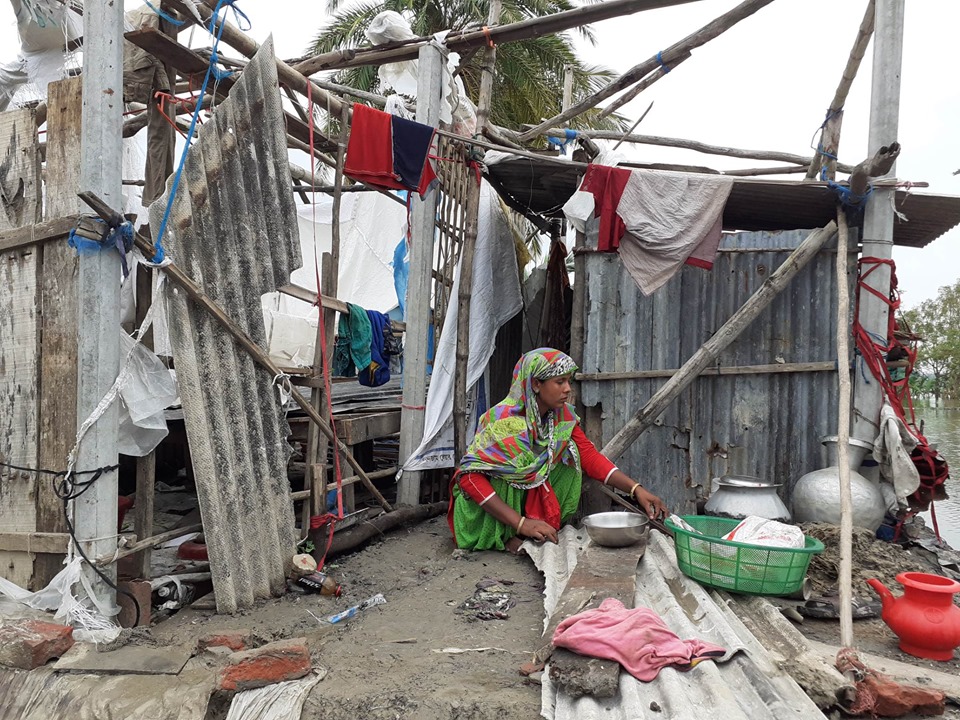
This World Humanitarian Day highlights the immediate human cost of the climate crisis and calls on world leaders to take meaningful climate action for the world’s most vulnerable people. With the theme #TheHumanRace, the focus is on the race against time and the need for everyone to work together to reach the finishing line – leaving no one behind.
Sharmin Ruba, who works in Bangladesh for Islamic Relief, reports on the effects of climate change in the country and our work to reach the most vulnerable people.
Globally, the scale of climate migration is on the rise already, as people flee the devastating effects of climate change. Droughts, crop failure, erosion and rising seas are predicted to fuel an acceleration in the numbers of people uprooted from their homes, with predictions that ecological threats and armed conflict could have displaced over 1 billion people by 2050. Near the equator, parts of the Earth could become too hot for human habitation.
Intensifying extreme weather in Bangladesh
Bangladesh is no stranger to disasters and heavy storms, particularly in monsoon season, but the frequency and intensity of extreme weather such as cyclones is getting worse, and the recurrence of disasters gives little time to recover from previous events.
In 2020 a third of Bangladesh was under water, owing to an abnormally strong monsoon season intensified by rising sea-surface temperatures. In addition, the country is regularly experiencing devastating cyclones, floods and riverbank erosion.
The world’s largest refugee settlement
Bangladesh faces complex humanitarian emergencies. Since 2017, over 1 million Rohingya Forcibly Displaced Myanmar Nationals (FDMN) have fled to Bangladesh and are living in the world’s largest refugee settlement, at Cox’s Bazar.
In February I visited Cox’s Bazar for an official meeting after a long hiatus. Cox’s Bazar was always very fascinating to me and I visited every year, enjoying the scenic beauty of the world’s longest sea beach that slopes gently down into the Bay of Bengal.
I used to take the marine drive way, and could not help but be mesmerised by the surroundings: the roads and the iconic beach on one side and lush green hills on the other, forming a beautiful contrast.
I hadn’t been since 2012, and anyone travelling there would be forgiven for thinking the Cox’s Bazar of 9 years ago and Cox’s Bazar of today are totally different places. Cox’s Bazar was home to significant areas of protected forest and an important wildlife habitat. The trees which gave the hills their beautiful green colour have been chopped down to provide fuel and many of the hills have been demolished.
Climate change is causing the more frequent and intense cyclones and flooding that threaten both Bangladeshis and the FDMN refugees, among the most vulnerable people in the world. Already living with ongoing uncertainty, refugees face flooding and landslides destroying their shelters and displacing them once again.
Providing support and solutions
To help ease the crowding the Bangladesh Government is relocating 100,000 refugees at an island in the Bay of Bengal, 37km away from the mainland and 6km away from Sandwip. It has given the opportunity to build better weather resistant shelters. The government has beautifully constructed 1,440 buildings, including cyclone shelters. The houses have been built four feet above the ground for added protection.
Bhashan Char is criss-crossed by several small canals and there is a forest. I did not get the opportunity to visit the island, though Islamic Relief has ensured food security and survival items for the relocated people. Islamic Relief is also taking care of their fuel needs, providing them with 5,400 LPG gas cylinders.
Giving families a source of fuel means they don’t have to cut down trees, which helps tackle deforestation.
Islamic Relief has also had several meetings with government officials to conduct a feasibility study into the livelihood opportunities here. This will create income generating activities for displaced people, potentially including tree plantation, kitchen gardens, poultry and cattle rearing, fishing and tailoring. By growing vegetables the island will become more green, which eventually will be a natural barrier like Sundarban.
In the race against the climate crisis, we can’t leave anyone behind – and I believe that our work will help bring significant improvement to people’s lives.
#TheHumanRace against climate change
World Humanitarian Day is a campaign by the United Nations Office for the Coordination of Humanitarian Affairs (OCHA) and humanitarian partners.
With this year’s theme of The Human Race there is a global challenge for climate action in solidarity with people who need it the most. To find out more go to https://2021.worldhumanitarianday.org
Islamic Relief works on the frontlines of climate change, providing lifesaving and life-changing support in vulnerable communities, and campaigns for bold action to tackle the climate emergency. This World Humanitarian Day, we pay tribute to our dedicated colleagues and supporters who make possible this work. With your support, we can do more: please donate today.




